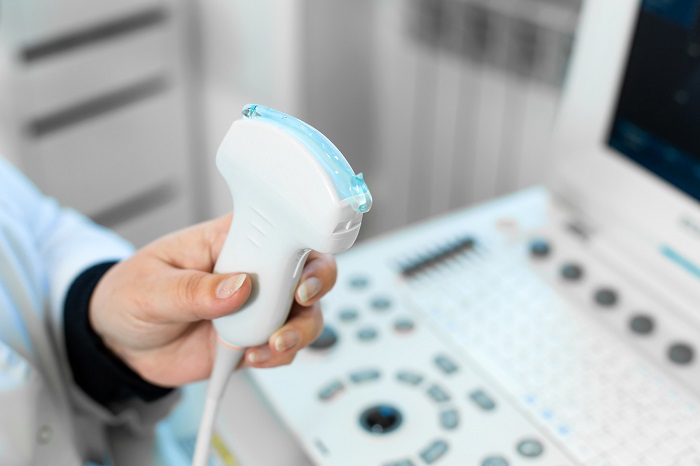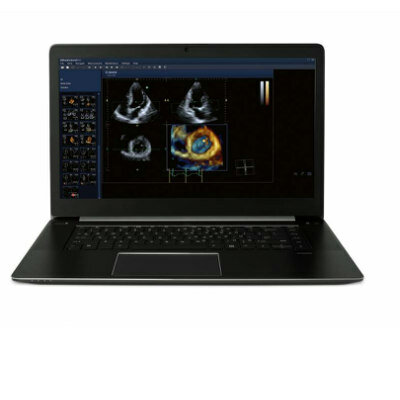AI-Based Approach Reduces False Positives in Mammography
|
By MedImaging International staff writers Posted on 18 Oct 2018 |
A team of researchers from the University of Pittsburgh (Pittsburgh, PA, USA) have developed an artificial intelligence (AI) approach based on deep learning convolutional neural network (CNN) that could identify nuanced mammographic imaging features specific for recalled but benign (false-positive) mammograms and distinguish such mammograms from those identified as malignant or negative.
The researchers conducted a study to find out whether deep learning could be applied to analyze a large set of mammograms in order to distinguish images from women with a malignant diagnosis, images from women who were recalled and were later determined to have benign lesions (false recalls), and images from women determined to be breast cancer-free at the time of screening.
The researchers used a total of 14,860 images of 3,715 patients from two independent mammography datasets, Full-Field Digital Mammography Dataset (FFDM - 1,303 patients) and Digital Dataset of Screening Mammography (DDSM - 2,412 patients). They built CNN models and used enhanced model training approaches to investigate six classification scenarios that would help distinguish images of benign, malignant, and recalled-benign mammograms. Upon combining the datasets from FFDM and DDSM, the area under the curve (AUC) to distinguish benign, malignant, and recalled-benign images ranged from 0.76 to 0.91. The higher the AUC, the better the performance, with a maximum of 1, according to Shandong Wu, PhD, assistant professor of radiology, biomedical informatics, bioengineering, intelligent systems, and clinical and translational science, and director of the Intelligent Computing for Clinical Imaging lab in the Department of Radiology at the University of Pittsburgh, Pennsylvania.
"We showed that there are imaging features unique to recalled-benign images that deep learning can identify and potentially help radiologists in making better decisions on whether a patient should be recalled or is more likely a false recall," said Wu. "Based on the consistent ability of our algorithm to discriminate all categories of mammography images, our findings indicate that there are indeed some distinguishing features/characteristics unique to images that are unnecessarily recalled. Our AI models can augment radiologists in reading these images and ultimately benefit patients by helping reduce unnecessary recalls."
Related Links:
University of Pittsburgh
The researchers conducted a study to find out whether deep learning could be applied to analyze a large set of mammograms in order to distinguish images from women with a malignant diagnosis, images from women who were recalled and were later determined to have benign lesions (false recalls), and images from women determined to be breast cancer-free at the time of screening.
The researchers used a total of 14,860 images of 3,715 patients from two independent mammography datasets, Full-Field Digital Mammography Dataset (FFDM - 1,303 patients) and Digital Dataset of Screening Mammography (DDSM - 2,412 patients). They built CNN models and used enhanced model training approaches to investigate six classification scenarios that would help distinguish images of benign, malignant, and recalled-benign mammograms. Upon combining the datasets from FFDM and DDSM, the area under the curve (AUC) to distinguish benign, malignant, and recalled-benign images ranged from 0.76 to 0.91. The higher the AUC, the better the performance, with a maximum of 1, according to Shandong Wu, PhD, assistant professor of radiology, biomedical informatics, bioengineering, intelligent systems, and clinical and translational science, and director of the Intelligent Computing for Clinical Imaging lab in the Department of Radiology at the University of Pittsburgh, Pennsylvania.
"We showed that there are imaging features unique to recalled-benign images that deep learning can identify and potentially help radiologists in making better decisions on whether a patient should be recalled or is more likely a false recall," said Wu. "Based on the consistent ability of our algorithm to discriminate all categories of mammography images, our findings indicate that there are indeed some distinguishing features/characteristics unique to images that are unnecessarily recalled. Our AI models can augment radiologists in reading these images and ultimately benefit patients by helping reduce unnecessary recalls."
Related Links:
University of Pittsburgh
Latest Industry News News
- Hologic Acquires UK-Based Breast Surgical Guidance Company Endomagnetics Ltd.
- Bayer and Google Partner on New AI Product for Radiologists
- Samsung and Bracco Enter Into New Diagnostic Ultrasound Technology Agreement
- IBA Acquires Radcal to Expand Medical Imaging Quality Assurance Offering
- International Societies Suggest Key Considerations for AI Radiology Tools
- Samsung's X-Ray Devices to Be Powered by Lunit AI Solutions for Advanced Chest Screening
- Canon Medical and Olympus Collaborate on Endoscopic Ultrasound Systems
- GE HealthCare Acquires AI Imaging Analysis Company MIM Software
- First Ever International Criteria Lays Foundation for Improved Diagnostic Imaging of Brain Tumors
- RSNA Unveils 10 Most Cited Radiology Studies of 2023
- RSNA 2023 Technical Exhibits to Offer Innovations in AI, 3D Printing and More
- AI Medical Imaging Products to Increase Five-Fold by 2035, Finds Study
- RSNA 2023 Technical Exhibits to Highlight Latest Medical Imaging Innovations
- AI-Powered Technologies to Aid Interpretation of X-Ray and MRI Images for Improved Disease Diagnosis
- Hologic and Bayer Partner to Improve Mammography Imaging
- Global Fixed and Mobile C-Arms Market Driven by Increasing Surgical Procedures
Channels
Radiography
view channel
Novel Breast Imaging System Proves As Effective As Mammography
Breast cancer remains the most frequently diagnosed cancer among women. It is projected that one in eight women will be diagnosed with breast cancer during her lifetime, and one in 42 women who turn 50... Read more
AI Assistance Improves Breast-Cancer Screening by Reducing False Positives
Radiologists typically detect one case of cancer for every 200 mammograms reviewed. However, these evaluations often result in false positives, leading to unnecessary patient recalls for additional testing,... Read moreMRI
view channel
Low-Cost Whole-Body MRI Device Combined with AI Generates High-Quality Results
Magnetic Resonance Imaging (MRI) has significantly transformed healthcare, providing a noninvasive, radiation-free method for detailed imaging. It is especially promising for the future of medical diagnosis... Read more
World's First Whole-Body Ultra-High Field MRI Officially Comes To Market
The world's first whole-body ultra-high field (UHF) MRI has officially come to market, marking a remarkable advancement in diagnostic radiology. United Imaging (Shanghai, China) has secured clearance from the U.... Read moreUltrasound
view channel
Portable Ultrasound Tool Uses AI to Detect Arm Fractures More Quickly
Suspected injuries to the upper limbs are a major reason for visits to hospital emergency departments. Currently, wait times for an X-ray and subsequent doctor consultation can vary widely, typically ranging... Read more.jpg)
Diagnostic System Automatically Analyzes TTE Images to Identify Congenital Heart Disease
Congenital heart disease (CHD) is one of the most prevalent congenital anomalies worldwide, presenting substantial health and financial challenges for affected patients. Early detection and treatment of... Read more
Super-Resolution Imaging Technique Could Improve Evaluation of Cardiac Conditions
The heart depends on efficient blood circulation to pump blood throughout the body, delivering oxygen to tissues and removing carbon dioxide and waste. Yet, when heart vessels are damaged, it can disrupt... Read more
First AI-Powered POC Ultrasound Diagnostic Solution Helps Prioritize Cases Based On Severity
Ultrasound scans are essential for identifying and diagnosing various medical conditions, but often, patients must wait weeks or months for results due to a shortage of qualified medical professionals... Read moreNuclear Medicine
view channel
New PET Biomarker Predicts Success of Immune Checkpoint Blockade Therapy
Immunotherapies, such as immune checkpoint blockade (ICB), have shown promising clinical results in treating melanoma, non-small cell lung cancer, and other tumor types. However, the effectiveness of these... Read moreNew PET Agent Rapidly and Accurately Visualizes Lesions in Clear Cell Renal Cell Carcinoma Patients
Clear cell renal cell cancer (ccRCC) represents 70-80% of renal cell carcinoma cases. While localized disease can be effectively treated with surgery and ablative therapies, one-third of patients either... Read more
New Imaging Technique Monitors Inflammation Disorders without Radiation Exposure
Imaging inflammation using traditional radiological techniques presents significant challenges, including radiation exposure, poor image quality, high costs, and invasive procedures. Now, new contrast... Read more
New SPECT/CT Technique Could Change Imaging Practices and Increase Patient Access
The development of lead-212 (212Pb)-PSMA–based targeted alpha therapy (TAT) is garnering significant interest in treating patients with metastatic castration-resistant prostate cancer. The imaging of 212Pb,... Read moreGeneral/Advanced Imaging
view channelBone Density Test Uses Existing CT Images to Predict Fractures
Osteoporotic fractures are not only devastating and deadly, especially hip fractures, but also impose significant costs. They rank among the top chronic diseases in terms of disability-adjusted life years... Read more
AI Predicts Cardiac Risk and Mortality from Routine Chest CT Scans
Heart disease remains the leading cause of death and is largely preventable, yet many individuals are unaware of their risk until it becomes severe. Early detection through screening can reveal heart issues,... Read moreImaging IT
view channel
New Google Cloud Medical Imaging Suite Makes Imaging Healthcare Data More Accessible
Medical imaging is a critical tool used to diagnose patients, and there are billions of medical images scanned globally each year. Imaging data accounts for about 90% of all healthcare data1 and, until... Read more



















